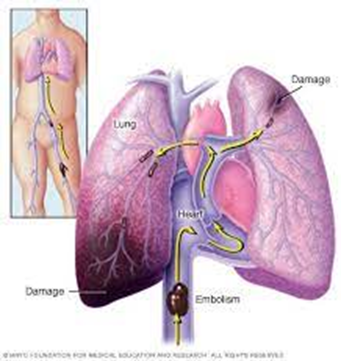A nurse is assessing a client who has tension pneumothorax. Which of the following findings should the nurse expect following tracheal deviation?
Respiratory alkalosis
Increased venous return
Decreased cardiac output
Dilated ventricles
The Correct Answer is C
Choice A Reason:
Respiratory alkalosis is incorrect. Tension pneumothorax typically leads to respiratory distress and hypoxemia rather than respiratory alkalosis. The respiratory alkalosis may occur initially due to hyperventilation in response to hypoxemia but would not be directly related to tracheal deviation.
Choice B Reason:
Increased venous return is incorrect. Tension pneumothorax actually leads to decreased venous return due to compression of the great vessels in the thorax, particularly the superior vena cava and the inferior vena cava. This compression results from the increased pressure within the thorax, which impedes blood flow back to the heart.
Choice C Reason:
Decreased cardiac output is incorrect. Tension pneumothorax can indeed lead to decreased cardiac output due to compression of the heart and the great vessels by the accumulating air in the pleural space. This compression decreases venous return and impairs cardiac function.
Choice D Reason:
Dilated ventricles is incorrect. As mentioned earlier, tension pneumothorax can lead to compression of the heart, including the ventricles. This compression can cause dilatation of the ventricles, particularly the right ventricle, due to increased afterload and decreased venous return.
Nursing Test Bank
Naxlex Comprehensive Predictor Exams
Related Questions
Correct Answer is ["A","B","C","D"]
Explanation
Choice A Reason:
Chronic cough is correct. Persistent cough is a common symptom of COPD, often occurring due to irritation and inflammation in the airways.
Choice B Reason:
Sputum production is correct. COPD patients frequently experience increased mucus production, leading to coughing up phlegm or sputum, especially in the morning.
Choice C Reason:
Dyspnea is correct. Shortness of breath or dyspnea is a hallmark symptom of COPD, particularly during physical activity or exertion, and it tends to worsen as the disease progresses.
Choice D Reason:
Wheezing occurs due to narrowed airways and increased airway resistance. It is more noticeable during expiration but can also be present during inspiration in severe cases.
Choice E Reason:
Chest tightness is incorrect. While chest tightness can occur in COPD, it is typically more associated with asthma. However, some individuals with COPD may experience chest tightness, especially during exacerbations or when airflow is significantly limited.
Correct Answer is D
Explanation
Correct answer: D
Choice A Reason:
Decreased pulmonary vascular resistance is incorrect. Inflammatory mediators released in response to a pulmonary embolism can lead to vasoconstriction and increased pulmonary vascular resistance. This is part of the body's response to redirect blood flow away from the affected area of the lung and maintain adequate perfusion to other areas.
Choice B Reason:
Hypercapnia is incorrect. Hypercapnia refers to elevated levels of carbon dioxide (CO2) in the blood.Hypocapnia usually is present with embolism; hypercapnia, on the other hand, is rare.
Choice C Reason:
Hypoventilation is incorrect. Hypoventilation occurs when there is inadequate ventilation of the lungs relative to metabolic demands. In the context of a pulmonary embolism, hypoventilation can occur due to factors such as pain, respiratory muscle fatigue, or impaired gas exchange, all of which can be influenced by the release of inflammatory mediators.
Choice D Reason:
Respiratory alkalosis is correct.In response to the blockage and the resulting inflammation, the body often increases the respiratory rate as a compensatory mechanism to maintain adequate oxygen levels and remove carbon dioxide.Due to the increased breathing rate, there is excessive exhalation of carbon dioxide, leading to a decrease in the partial pressure of CO2 in the blood. This results in an increase in blood pH, causing respiratory alkalosis.

Whether you are a student looking to ace your exams or a practicing nurse seeking to enhance your expertise , our nursing education contents will empower you with the confidence and competence to make a difference in the lives of patients and become a respected leader in the healthcare field.
Visit Naxlex, invest in your future and unlock endless possibilities with our unparalleled nursing education contents today
Report Wrong Answer on the Current Question
Do you disagree with the answer? If yes, what is your expected answer? Explain.
Kindly be descriptive with the issue you are facing.
